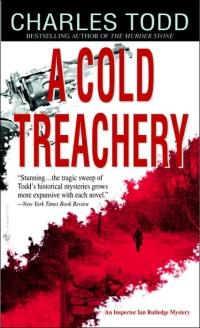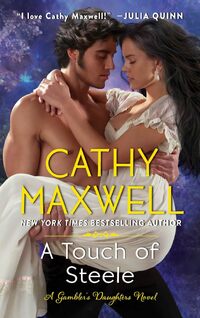 THE TRADWIFE'S SECRET |
 Sunshine, secrets, and swoon-worthy stories—June's featured reads are your perfect summer escape. |

Purchase
Ian Rutledge #7 Mystery Historical Excerpt of A Cold Treachery by Charles ToddCHAPTER ONE The North of England He ran through the snow, face into the swirling wind, feet pounding deep trenches into the accumulating drifts. Rocks, their shapes no longer familiar under the soft white blanket, sent him sprawling, and he dragged himself up again, white now where the snow clung, and almost invisible in the darkness. He had no idea what direction he had taken, enveloped by unreasoning panic and hardly able to breathe for the pain inside him. All he could hear was the voice in his head, shouting at him-- "You will hang for this, see if you don't. It's my revenge, and you'll think about that when the rope goes round your neck and the black hood comes down and there's no one to save you--" The sound of the shot was so loud it had shocked him, and he couldn't remember whether he had slammed the door behind him or left it standing wide. He could still smell the blood--so much of it!--choking in the back of his throat like feathers thrown on a fire. He could feel the terror, a snake that coiled and writhed in his stomach, making him ill, and the drumming wild in his head. They would catch him. And then they'd hang him. There was nothing he could do to prevent it. Unless he died in the snow, and was buried by it until the spring. He'd seen the frozen body of a dead lamb once, stiff and hard, half rotted and sad. The ravens had been at it. He hated ravens. Half the countryside knew he'd been a troublemaker since the autumn. Restless--unhappy--growing out of himself and his clothes. They'd look at what lay in that bloody room, and they'd hate him. He was crying now, tears scalding on cold skin,and the voice was so loud it seemed to be following him, and he ran harder, his breath gusting in front of his face, arms pumping, pushing his way through the snow until his muscles burned. "You'll hang for this--see if you don't----!" He would rather die in the snow of cold and exhaustion than with a rope around his neck. He'd rather run until his heart burst than drop through the hangman's door and feel his throat close off. Even with the ravens eating him, the snow was cleaner. . . . "You'll hang for this--see if you don't----! That's my revenge . . . my revenge . . . my revenge. . . ." CHAPTER TWO Paul Elcott stood in the kitchen beside Sergeant Miller, his face pale, his hand shaking as he unconsciously brushed the back of it across his mouth for the third time. "They're dead, aren't they? I haven't touched them--I couldn't--Look, can we step outside, man, I'm going to be sick, else!" Miller, who had come from a butcher's family, said stolidly, "Yes, all right. The doctor's on his way, but there's nothing he can do for them." Except pronounce them dead, he added to himself. Poor souls. What the devil had happened here? "We might as well wait in the barn, then, until he's finished." Elcott stumbled out the door. He made his way to the barn, where he was violently sick in one of the empty horse stalls. Afterward he felt no better. He could still see the kitchen floor--still smell the sickening odor of blood- - And the eyes--half closed--staring at nothing the living could see. Had Gerald looked at Hell? He'd said the trenches were worse-- He sat down on a bale of hay, and dropped his head in his hands, trying to regulate his breathing and hold on to his senses. He should have sent the sergeant back alone. He'd been mad to think he could face that slaughter again. After a while, Sergeant Miller came across to the barn, and the doctor was with him, carrying a lantern. Elcott lifted his head to nod at Dr. Jarvis. He cleared his throat and said, "They didn't suffer, did they? I mean--no one lingered--" "No. I don't believe they did," the doctor answered quietly, coming to stand by him and lifting the lantern a little to shine across Elcott's face. He prayed it was true. He couldn't be sure until the autopsies. Without moving the bodies, he'd been able to find only a single gunshot wound in each, to the chest, with resulting internal trauma. Sufficient to kill. A surge of sympathy swept Jarvis and he reached out to press Elcott's shoulder. The bloody dead were this man's family. His brother, his brother's wife, their children. An unspeakable shock . . . The doctor himself had been badly shaken by the scene and found it difficult to imagine how he would answer his wife, when she asked him why the police had come to fetch him in the middle of his dinner. Nothing in his practice had prepared him for such a harrowing experience. It was, he thought, something one might see in war, not in a small, peaceful farmhouse. At length he said gently to Elcott, "Let me take you home, Paul, and give you something to help you sleep." "I don't want to sleep. I'll have nightmares." Without warning Elcott began to cry, his face crumpled and his chest heaving. His nerve gone. The doctor gripped the weeping man's shoulder, and looked to Sergeant Miller over his head. "I wish I knew what's keeping Inspector Greeley--his wife told me he'd gone to see if the Potters needed help getting out. I hope to God he hasn't stumbled on anything like this!" "We'll know soon enough," the sergeant replied. They listened to the sobbing man beside them, feeling helpless in the face of his grief. "I ought to take him home," Jarvis said. "He's no use to you in this state. You can wait for Greeley. When you're ready for me, I'll be with Elcott." Miller nodded. "That's best, then." He glanced at Elcott, then jerked his head, moving to the door. Jarvis followed him. The two men stood there in the late afternoon light, gray clouds so heavy that it was difficult to tell if dusk was coming, or more snow. It had been a freak two-day storm, fast moving with a heavy fall, and the skies still hadn't cleared. The roads were nearly impassable, the farm lanes worse. It had taken Miller a good hour to reach the house, even following in the ruts left by Elcott's carriage. "There's one still missing." Miller pitched his voice so that Elcott couldn't hear him. "I daresay Elcott's not noticed. I've walked through the rest of the house. He's not there." "Josh? By God, I hadn't--Is he in the outbuildings, do you think?" Jarvis shivered and glanced over his shoulder at the unlit interior of the small barn, with its stalls, plows, barrows, tack, and other gear stacked neatly, the hay in the loft, filling half the space. Two horses and a black cow watched him, ears twitching above empty mangers. "Gerald Elcott was always a tidy man. It shouldn't take long to search." Miller counted on his gloved fingers. "Elcott penned his sheep, against the storm. I could see them up there to the east of Fox Scar. Stabled his horses, and brought in the cow. At a guess, then, he was alive this time Sunday, when the snow was coming down hard and he knew we were in for it. But the cow's not been milked since, nor the stalls mucked out, nor feed put down." "That confirms what I saw inside. I'd say they've been dead since Sunday night." Jarvis frowned and stamped his feet against the cold, torn. "I should stay until you've found Josh. In the event there's anything I can do. . . ." "No, take Elcott back. If the rest are dead, the boy is as well. I'll manage." The doctor nodded. He was moving toward Elcott again, when Miller cautioned, "Best to say nothing about what we've seen"--he gestured to the house--"in the village. Until we know a little more. We don't want a panic on our hands." "No. God, no." Jarvis handed the lantern to Miller and settled his hat firmly on his head against the wind. Raising his voice, he said, "Now then, Paul, let's take you home, and I'll find something to help you get past this." "Someone has to look after the animals," Elcott protested. "And I want to help search. For whoever it was killed them. I want to be there when you find this bastard." "That's to your credit," Miller answered him. "But for now, I'd go with the doctor if I was you. I'll see to the beasts, and there'll be someone to care for them tomorrow. Leave everything to us. As soon as we know anything, I'll see you're told." Elcott walked to the barn door and stepped outside, unable to turn away from the silent house just across the yard. "I wish I knew why," he said, his voice ragged with grief. "I just wish I knew why. What had they ever done to deserve--?" "That'll come out," Miller told him calmly, soothingly. "In good time." Elcott followed Jarvis to the horse-drawn carriage that had brought the doctor out to the isolated farm. The only tracks in the snow were theirs, a hodgepodge of footprints around the kitchen door of the house, and the wheel markings of the two vehicles, cart and carriage. Beyond these, the ground was smoothly white, with only the brushing of the wind and the prints of winter birds scratching for whatever they could find. As if only just realizing that the cart was his, Elcott stopped and said, "Dr. Jarvis--I can't--" "Leave it for Sergeant Miller, if you will. He'll bring it back to town later. I expect he'll need it tonight" "Oh--yes." Dazed, Elcott climbed into the carriage and settled himself meekly on the seat, stuffing his cold hands under his arms. By the time Inspector Greeley had completed his examination of the Elcott farmhouse, he was absolutely certain of one thing. He needed help. Five dead and one missing, believed dead. It was beyond comprehension--beyond the experience of any man to understand. In Urskdale with its outlying farms and vast stretches of barren mountainous landscape, his resources were stretched thin as it was. The first priority was making certain that all the other dale families were accounted for, that this carnage hadn't been repeated--God forfend!--in another isolated house. And there was the missing child to find. All the farm buildings, sheep pens, shepherds' huts, and tumbled ruins had to be searched. The slopes of the fells, the crevices, the small dips and swales, the banks of the little becks. It would take more men than he could muster. But he'd have to make do with what he had, summon the dale's scattered inhabitants and work them to the point of exhaustion. And time was short, painfully short, if that child had the most tenuous hope of surviving. Overwhelmed by the sheer enormity of what lay ahead, Greeley did what his people had done for generations here in the North: He buttoned his emotions tightly inside and grimly set about what had to be done. It was well after midnight when he got back to the small police station that stood six houses from the church on the main street of Urskdale. The inspector laboriously wrote out a message and found an experienced man to carry it to the Chief Constable. "Make the fastest time you can," the man was told. "It's urgent." On his drive back to the police station, Greeley had already compiled a mental list of the outlying farms, roughly grouping them by proximity. And then, to keep his mind busy and away from that dreadful, bloody kitchen, he had considered what the searchers would need--lanterns, packets of food, Thermoses of tea, rope. But that was easier; each man would know from experience what to bring. Locating lost walkers in the summer had taught them all how to plan. Jarvis had said two days--that the Elcotts had been dead two days. This madman had already had more than sufficient time to track the boy over the snow, and then vanish. Or spread his net to other victims . . . What in hell's name would the search parties discover, as they knocked on doors? Greeley capped his pen and set it in the dish. A general warning now would come far too late to help anyone else. But the search had to go on. A search for the boy, for the killer--for other victims. As he rose to leave, turning down the lamp on his desk, an appalling thought struck him. What if the murderer was an Urskdale man? Where had he spent these last forty-eight hours? Safely at home by his hearth? If he hadn't found the boy after all, would he make certain that he was included among the searchers? What if he, Greeley, was about to set the fox amongst the hounds, unwittingly sending the killer out with an innocent man, to search for himself? He felt as if he'd not slept for a week--the tension in his body and the nightmare in his mind seemed to envelop him. In the darkness the inspector rubbed his gritty eyes with his fists. When he walked out the door to face the somber men collecting outside the station, would one of them look away, unable to meet his glance? Would he read suspicion into the turn of a head or the restless stamp of feet? He knew each individual in his patch too well to believe one of them was a vicious killer. Or--until now he'd thought he did. More to the point, he needed every man he could lay hands to; he couldn't afford to speculate. Still, he would send them out in threes, not twos. Just in case. As he finally strode down the passage, he could hear the first arrivals talking among themselves, coming in, some of them, as soon as the news reached them. A few at a time, on foot, on horseback, their numbers slowly swelling. The blast of icy air hit him in the face as he went through the door, a shock to warmed skin. Nothing, he thought, to match his shock at the Elcott farm. In all his years as a policeman, he had never seen anything like the scene in that farmhouse kitchen. Try as he would, he couldn't imagine the kind of malevolence that could do such a thing. Try as he would, he couldn't shut it out of his mind. He and his men had lifted the five stiff bodies onto blankets and carried each out to the waiting cart. He could still feel the small bodies of the children, resting so lightly in his arms. Blind anger swept him so that he felt sick with it, helpless and for the first time in his life, vengeful. Excerpt from A Cold Treachery by Charles Todd |
|
| |||
|
||||



 © 2003-2025
© 2003-2025